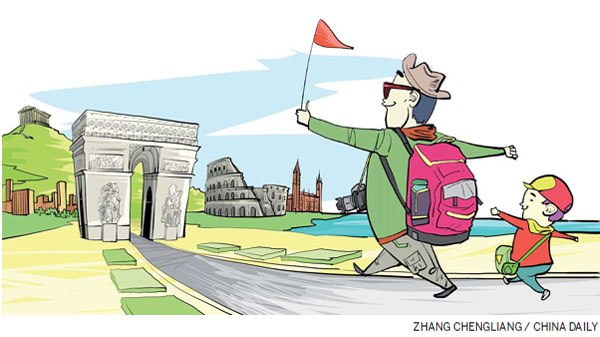 Appreciation of the needs and culture of people from various regions would be good starting point
Appreciation of the needs and culture of people from various regions would be good starting point
Spring has finally arrived across Europe and with it the start of the holiday season. Tourists from all over the world will doubtless flock to the numerous European tourist destinations and once again a dramatic increase in the numbers from the Chinese mainland is predicted.
The China Tourism Academy says the number of tourists from the country who will choose Europe this year is forecast to more than double from last year's 3.5 million.
Furthermore, 100 million Chinese are forecast to travel overseas this year and this number is set to double by 2020. Most venture no further than neighboring Asian countries/destinations but this is not simply due to cost and time factors. Geographical proximity is a factor but far more important is the psychological distance. China's emerging middle class feels more comfortable with Asian culture.
European countries have indeed relaxed visa requirements and are making an extra effort to attract the growing numbers of cash-rich Chinese tourists.
For example, France, Italy and Belgium have all recently streamlined their visa application procedures and processes specifically for Chinese tourists.
But have extra special efforts also been made to gain a real understanding of the needs and wants of the typical Chinese tourist in Europe? Is this one relatively homogenous group or are different segments emerging?
For European countries, this surge in numbers from China presents both an opportunity and a threat. Such is the surge that little time has been, or could have been, spared to conduct much-needed research into this new and complex consumer group.
Tapping into their demographic profile is all too easy but not sufficiently insightful. Psycographic profiling and benefit segmentation are more important.
News report after news report provides detailed information on numbers, spending power and patterns and different types of tourism experience but little attention has been afforded to the psychological and cultural influences that underpin consumption choice in this (and most areas).
A majority are urban residents from one of China's first-tier cities but more and more are coming from second-tier cities.
Across Europe's vast tourism sector, few are even aware of the names of many of China's cities and provinces with their rich histories and strong sub-cultures.
Chinese citizens, of all ages and areas, remain fiercely proud, patriotic and nostalgic despite the rapid economic growth of the past three decades. But is the European tourism industry knowledgeable in this regard?
The industry certainly faces a huge challenge but only those with a keen insight into the needs and wants of Chinese tourists will reap the rewards.
Patriotism and nostalgia apply, of course, at the national level but with such a vast landmass and long and rich history China possesses strong geographically-defined sub-cultures. Nowhere is this more profound than China's most prominent city cultures and particularly among those cities that at some time during Chinese history have been the capital.
Beijing, Nanjing, Xi'an, Hangzhou, Luoyang and Kaifeng are the six cities to have had the honor of being the national capital.
Tourists native to these cities will be very conscious of their cities' heritage and status and will value highly any understanding of this during their European experience. Initial greetings with Chinese tourists in Europe could involve asking about their home town/city and province. Any knowledge of their hometown's history will be appreciated and help with the development of customer relationships.
We Recommend:
